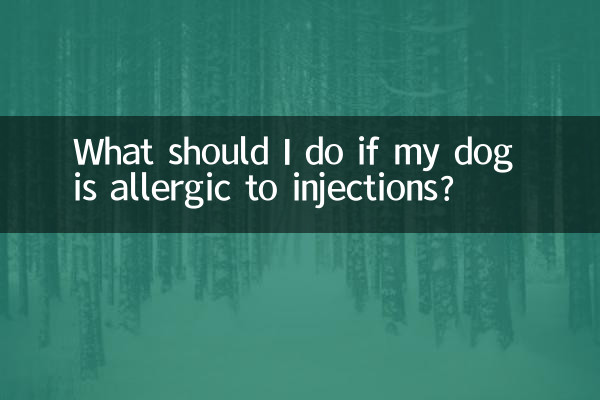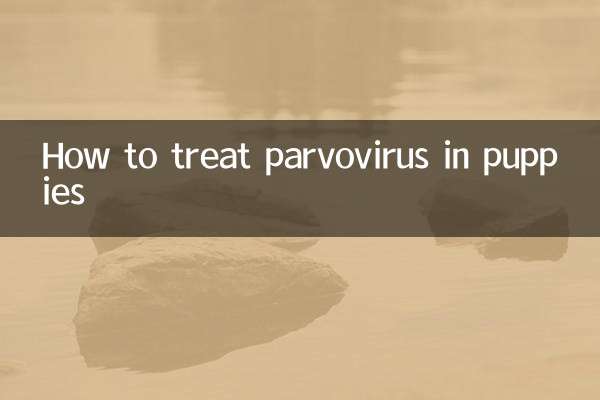What should I do if my dog is allergic to injections?
In recent years, pet health issues have attracted much attention, especially the common occurrence of allergic reactions in dogs after vaccinations or injections. This article will combine the hot topics and hot content on the Internet in the past 10 days to provide pet owners with a detailed response guide.
1. Common symptoms of dog allergy to injections

There are various symptoms of allergic reactions in dogs after injections. The following are common symptoms:
| Symptom type | Specific performance |
|---|---|
| skin reaction | redness, itching, hives |
| digestive system reaction | Vomiting, diarrhea, drooling |
| Respiratory system reaction | Difficulty breathing, coughing, wheezing |
| systemic reaction | Weakness, shock, confusion |
2. Emergency treatment measures for dogs allergic to injections
If your dog is found to have an allergic reaction, you should take the following measures immediately:
| step | Specific operations |
|---|---|
| 1. Keep calm | Don’t panic and avoid scaring your dog |
| 2. Contact your veterinarian | Call the pet hospital immediately for professional advice |
| 3. Observe symptoms | Document the severity and rate of development of allergic reactions |
| 4. Emergency treatment | Depending on veterinary guidance, antihistamines or epinephrine may be needed |
3. Methods to prevent dog allergies from injections
Prevention is better than cure, here are some tips to reduce your dog’s risk of injection allergies:
| Precautions | Specific instructions |
|---|---|
| Choose a regular hospital | Ensure vaccine quality and injection technology expertise |
| Know your allergy history | Let your veterinarian know in advance if your dog has allergies |
| Observation period | After the injection, stay in the hospital for observation for 30 minutes before leaving. |
| Disperse injection | Don’t give too many vaccines at one time |
4. Hot topics related to the entire network in the past 10 days
According to data analysis across the entire network, hot topics about pet allergies in the past 10 days include:
| topic | heat index |
|---|---|
| Pet vaccine allergy first aid knowledge | ★★★★★ |
| How to choose a safe pet hospital | ★★★★☆ |
| Home emergency treatments for pet allergies | ★★★★☆ |
| Progress in R&D of New Pet Vaccines | ★★★☆☆ |
5. Professional veterinary advice
According to the advice of many veterinary experts, owners should pay attention to the following points when it comes to dog allergies:
1.Tell your allergies in advance: Before giving your dog an injection, be sure to explain to your veterinarian whether your dog has a history of allergies, including food allergies, drug allergies, etc.
2.Choose the right time: It is best to take your dog for an injection in the morning, so that if an allergic reaction occurs, you can seek medical treatment in time.
3.Prepare emergency medication: For dogs with a history of allergies, you can ask your veterinarian to prescribe some anti-allergy drugs as a backup.
4.Observe closely after injection: Observe the dog for at least 30 minutes after the injection and pay attention to the dog’s behavioral changes and physical condition.
6. Frequently Asked Questions
Q: How long will it take for dogs to show symptoms after being allergic to an injection?
A: Anaphylaxis may occur within minutes or hours. Acute allergies usually appear within 30 minutes.
Q: How long will an allergic reaction last?
A: Mild allergies may resolve on their own within a few hours, while severe allergies require immediate medical attention and may last for several days.
Q: Can I still continue to get vaccinated after allergic reactions?
A: You need to consult your veterinarian, and you may need to switch to other vaccines or take preventive measures.
Conclusion
The health of your dog is every owner's responsibility, and it's important to know how to deal with injectable allergies. We hope that the detailed introduction in this article can help pet owners make correct judgments and handle them when encountering similar situations. Remember, prompt medical attention is always the most important option.

check the details

check the details